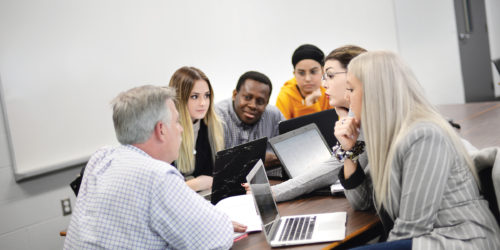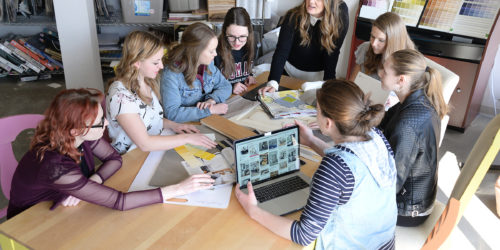
Help Students Build Dispute Resolution Skills for Group Work
By Michael Quartermain, Faculty, School of Business
While Conestoga’s programs teach core knowledge and skill sets related to particular fields of study, they also provide opportunities for students to develop “soft” or “essential” skills for life after college. Working in groups is one of these opportunities.
In the School of Business, many of our postgraduate certificates and diploma-level programs have a group work component. Our programs’ learning outcomes link to not only course subject matter but also the “essential” skills for working in cross-functional settings. Students learn to manage workflow while communicating and collaborating with others who have varying skill levels and different personalities. Today, many companies operate in cross-functional teams, and the skills learned will prepare students for this business environment.

As an educational background in alternative dispute resolution (ADR) and conflict studies combined with over 30 years of practical business experience, as a faculty member, I believe that coaching and mentoring students through dispute events is a piece of a focus on student success. A student-centred approach to supporting groups experiencing conflict is especially prescient now that our sections have moved from in-class to continuation online, which may present different challenges and require new approaches.
In speaking with many Conestoga faculty, I have found that most have experienced some form of disputes within groups. Each dispute will be unique, and each faculty member will approach their dispute differently based on their own experiences. Yet, faculty face the same question: “If I do not manage this, what are the potential outcomes?” Typical outcomes can include: the situation resolves itself, students in a group fail a course, or the problem escalates to a higher level.
How can faculty manage group disputes to avoid failure or escalation, and give students the tools they need for future success? I have developed faculty resources–a presentation slide deck and accompanying case study–that aim to assist faculty in understanding the issues behind group disputes and providing some strategies to mitigate and resolve them. The focus is the collective outcome of helping students pass courses by actively supporting and coaching them through events, rather than letting them figure it out and potentially fail.
These resources, which are accessible for download below, prioritize getting faculty talking about how they can deliver the course outcomes and help students work together to get that done. Much of the inspiration for the resources I have developed comes from how I might have applied them in my early teaching career had they been available to me.
Leadership coach Erika Anderson says, “In order to thrive in today’s business world, we have to let go of the idea that being an adult means being an expert at everything.” When it comes to group work, I see my role as coaching students in the development of skills that will help them to be more open to how others are experiencing situations and to respond from those other perspectives. Such “soft” skills are critical for resolving the disputes they will face in the business world (and in many other parts of their lives).
As faculty, we benefit from that same lesson—by empathizing with students who face conflict in group work, we can evolve our teaching practices to teach better and support them.
Using the Online Dispute Resolution Resources
For new faculty, I hope that these resources will be a place to start thinking about how they can prepare to support their students in group work. For faculty who have past experiences with group disputes, I hope the resources may be useful for expanding and deepening how to help students navigate group work in courses delivered remotely.
These resources may be accessed online by individual faculty or adapted for full program use. I can envision a 90-minute faculty training that is focused on working through a case study (30 minutes to review material; 45 minutes to work in team role-play; 15 minutes to de-brief). They may also be turned into a similar session for students.
Download Resources:

References
Anderson, E. (2016, March 8). How What You Already Know Prevents You From Learning New Things. Fast Company. Available at https://www.fastcompany.com/3056488/how-what-you-already-know-prevents-you-from-learning-new-t
See links to other articles by Michael Quartermain via LinkedIn.
- Supply Chain; Vulnerability, Visibility, and Value. Available at https://www.linkedin.com/pulse/supply-chain-vulnerability-visibility-value-michael/
- Agility, Adaptability, and Resilience for Competitive Advantage. Available at https://www.linkedin.com/pulse/agility-adaptability-resilience-competitive-advantage-michael/







Thank you Michael, it is helpful information, especially during remote teaching.